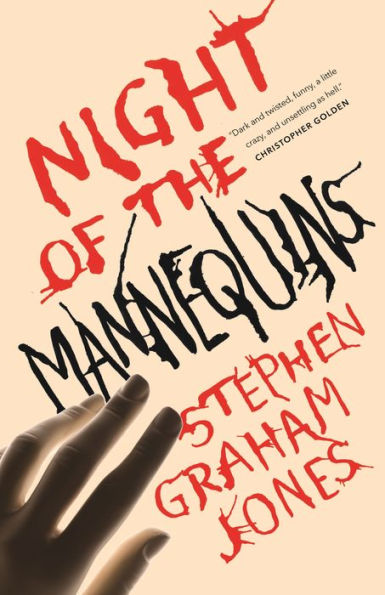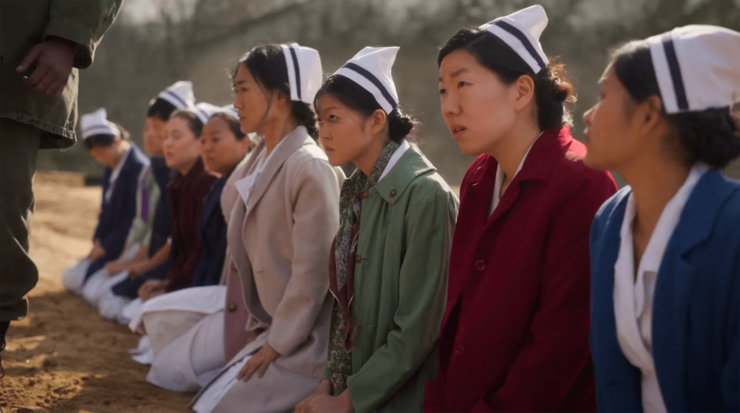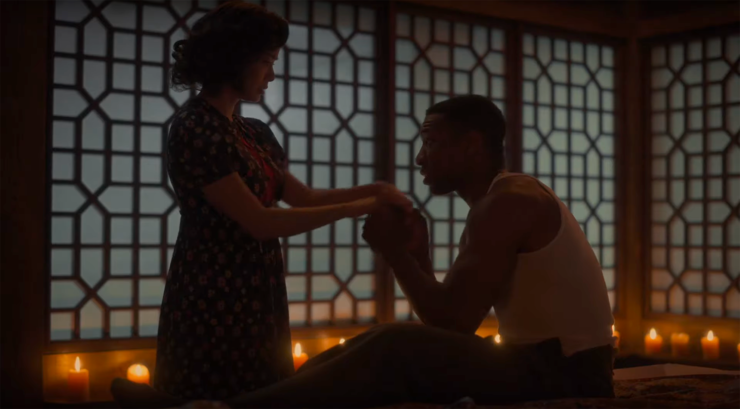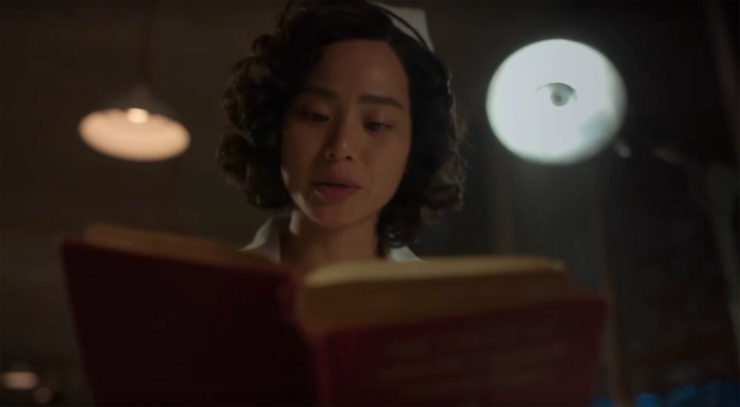I went into “Meet Me in Daegu” with a high level of suspicion. The last time Lovecraft Country devoted time to people who weren’t Black or white Americans, it didn’t go well. I knew Ji-ah’s storyline was coming and I’ve been lowkey dreading it ever since the anti-Indigenous and transphobic debacle with Yahima. Episode 6 was better than I expected, although there were still some issues…
Another fantastic and fantastical cold opening. A young woman, Ji-ah, sits in an empty movie theatre watching the musical Meet Me in St. Louis. She breaks into song and dance as she revels in the sweeping romance of the film. But in reality, she stares at the screen, with longing and fire in her eyes. Ji-ah lives with her widowed mother, Soon Hee, whom she calls Umma (Korean for “mother”). She insists Ji-ah bring home a man soon, but something in her daughter’s look warns the audience not to assume we know what’s really going on.
Buy the Book


Night of the Mannequins
While at nursing school, she watches the other women gossip about men. The way she is drawn to Young-Ja, it’s easy to think Ji-ah might be attracted to her. I doubt the show intended to make a subtle comparison to asexuality here, but I saw a lot of my own early closeted behavior reflected in Ji-ah’s actions in this scene. I “practiced” being straight by watching romance movies, listening to how friends talked about sex and dating, and parroting what I picked up. As we later learn, Ji-ah is practicing, too, but with a different endgame in mind.
After a disastrous evening of mimicking flirtatious behavior for a series of boring men at speed dating, Ji-ah winds up a third wheel on a date with Young-Ja and her beau for the evening. At the dabang (a coffee shop) she picks up a stray man and takes him home. Apparently she was speaking literally, not metaphorically, about her Umma’s demands. Nine tentacle-like tails slip out of her body; after she drains the life out of him she rips him apart. According to her Umma, if Ji-ah consumes one hundred souls she will revert back to human, but the daughter isn’t as enthusiastic about the prospect of more murder as the mother.
All that training pays off as the first wave of injured American soldiers arrive at the hospital. If only they were grateful to the Korean medical workers who treat them. Ji-ah and Young-Ja have another conversation about being your true self instead of what others want you to be, except this time her friend reveals she’s a communist spying for North Korea and China. That secret will soon cost her her life. American soldiers—lead by two Black men and a Korean translator—drag the nurses off to a field and kill two of them before Young-Ja comes clean. One of those killer soldiers is Atticus; the casual cruelty he displays is not that much different from Montrose killing Yahima or Samuel sacrificing Tic.

A few months later, Tic ends up in Ji-ah’s hospital, but he doesn’t remember her. She decides to kill him, to make him her 100th victim. Only, the more she gets to know him, the more she likes him. He sees her in a way no one else has, and he gives her the grand romance she always dreamed of. Finally she takes him home, not to kill him but to love him. For a while she’s able to contain herself, but eventually nature overtakes nurture. Yet this time she is able to use her monstrous power to help rather than hurt. Her tails burst forth and envelop Tic so she sees his past, but because she doesn’t kill him she also sees his future. For Tic, a man who doesn’t know about magic at all, the experience is too traumatic to understand. He flees from Ji-ah as she tries to tell him about his terrible fate.
The next day, Soon Hee and Ji-ah visit the mudang (a Korean female shaman) once more. This time they ask for help protecting the man she loves. Umma agrees to bear the cost for her daughter, but it may be higher than she’s able to pay. The mudang offers Ji-ah a warning or a curse: “You have not even become one with the darkness yet. You will see countless deaths before your journey is done.”
I don’t know enough about Korean folklore to praise or castigate the show for its portrayal of Ji-ah as a gumiho. But from what I’ve gleaned from my internet rabbit hole, what we see on screen is vastly different from the actual legendary creature. Traditionally, a gumiho is a nine-tailed fox that can shapeshift into a human, typically a beautiful woman or woman with fox-like features. Gumiho are almost always depicted as malevolent creatures who feed on the liver or heart of their victims (who are often male). The fox spirit has a yeowi guseul, a bead that contains knowledge and allows the gumiho to absorb the life energy of humans. Like all good folklore, stories vary about what they look like, their skills and eating habits, and how or if a gumiho can attain humanity.
All that being said, nothing in my admittedly limited research suggested a gumiho is a spirit that could be summoned by a mudang to possess the body of a human woman, that she can become human after consuming a hundred human lives, or that her nine tails function like tentacles. The alterations made for exciting visuals, particularly by playing on Lovecraftian horror tropes, but also left a sour taste in my mouth. Perhaps this is my aforementioned distrust speaking, but it felt like writers Misha Green and Kevin Lau took Korean folklore and ran it through a Japanophile hentai filter for maximum shock value. A nine-tailed fox-woman eating men’s hearts is scary enough without turning her into a sexy tentacle monster.
I get why the writers chose option B. The way they framed Ji-ah’s story, it parallels nicely with Tic’s. She is a young person who had dangerous magic forced upon her by a family member. As a human child, her father abused her while the only other adult in her life (her mother) did nothing to protect her until the damage was done. If Tic succeeds in learning the language of Adam, he could end up in a similar position as Ji-ah: stuck with the devastating consequences of a hastily made choice.
Samuel Braithwaite, Ruby, Christina, Umma, and Tic have at this point all dabbled in magic, with similar results. In a way, Umma is the midway point between Samuel and Tic. Samuel and Umma forced magic onto those who couldn’t consent, while Tic and Umma embraced magic without considering the price they would have to pay. Each acted selfishly—Samuel to gain access to the power of Creation, Umma to assuage her guilt of what happened to her daughter, Tic to gain power over his oppressors—but only Ruby, Umma, and Tic could mask their selfishness with good intentions.
However, as Ji-ah makes clear, intent doesn’t equal impact. Umma’s spell was a violation of Ji-ah just as Samuel’s spell violated Tic. Tic hasn’t yet been asked to cross any magical lines, but the time is coming and from what we’ve seen so far there’s no reason to expect he won’t at least consider walking down the same path as the others. The question of what makes a monster is something Ji-ah grapples with for most of the episode. Is it monstrous deeds or a monstrous heart? Leti is asking herself the same questions, but Tic is too mired in his obsession to worry about it.
Taking it back to the previous episode, the point isn’t that magic is inherently evil but that people tend to use it for selfish purposes. If the goal is power over others, it doesn’t matter if the reason is justifiable. Ruby could have used her temporary whiteness to help Tamara, but instead she opted for brutal violence. Christina could have used her spells to aid and protect Tic but chose to use them to consolidate power in her own hands. Umma asked the mudang for help getting rid of her husband, but instead of taking the work on herself she turned her own daughter into a monster. Ruby and Christina have thus far skated on luck and charm, but Samuel and Umma’s fate likely awaits both.
If Tic wants to find a way to use magic to help, he cannot keep doing what he’s doing. Leti used her privilege and knowledge of magic to free the trapped Black spirits, banish Hiram, and open her home up to those in her community in need (not her “artist friends,” as Ruby once pointed out). Hannah twice brought about beneficial results through magic, even though it cost her a great deal. The precedent is set. Atticus must choose: a monstrous hero or a heroic monster.

Cultural texts referenced
- Alexandre Dumas’s The Count of Monte Cristo is featured yet again. Presumably the movie Tic and Ji-ah discuss is the one from 1934, the first talkie film version.
- “The Trolley Song” from Meet Me in St. Louis (1946).
- Nearly 1.8 million Americans served during the Korean War (1950-1953). Of that, over 600,000 were African American. This was the first war where the military was fully desegregated, although racism and system oppression were still pervasive.
- The Alice Smith cover of “Sinnerman” that played over the end credits is fine, but it’s no match for Nina Simone’s.
Final thoughts
- Although the show uses the spelling “kumiho,” I use “gumiho.” The former spelling is from the McCune-Reischauer system, devised in 1937, while the latter is from the Revised Romanization of Korean that became standard in 2000. McCune-Reischauer is historically accurate for Korean-English translations, but my preference is always for locally created cultural traditions rather than those imposed by outsiders (George M. McCune and Edwin O. Reischauer were white Americans).
- Young-Ja has her own issues with monstrosity to contend with. Given what happened with North Korea at the end of the Korean War, do her actions make her good or evil? She fights for what she believes in, but what if she’s made the wrong choice?
- I was disappointed that the show let Tic off the hook as a murder. He never apologized to Ji-ah for killing the nurses. Rather than hold him to account, the show wiped away his sins by having him and Ji-ah fall in love.
- I also wanted a deeper discussion of colonialism and Tic’s role in perpetuating it. He volunteered to fight in a war on foreign soil and let himself hide in the shadows of “I was just following orders.”
- The handling of Young-Ja’s execution was also poorly handled. Her death was twisted until Tic’s feelings were centered; in other words, she was fridged so he could have some character development.
- Still no Hippolyta. Quelle horreur!
Alex Brown is a librarian by day, local historian by night, author and writer by passion, and an ace/aro Black woman all the time. Keep up with her on Twitter, Instagram, and her blog.










